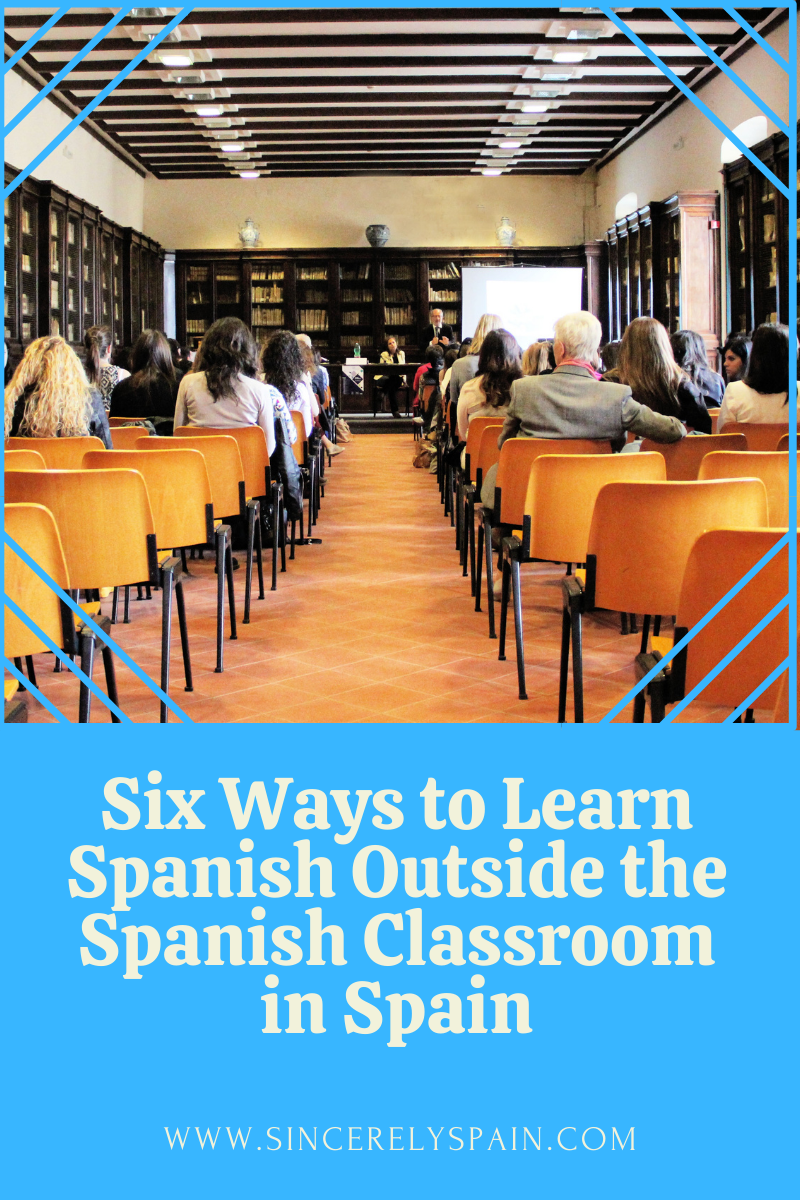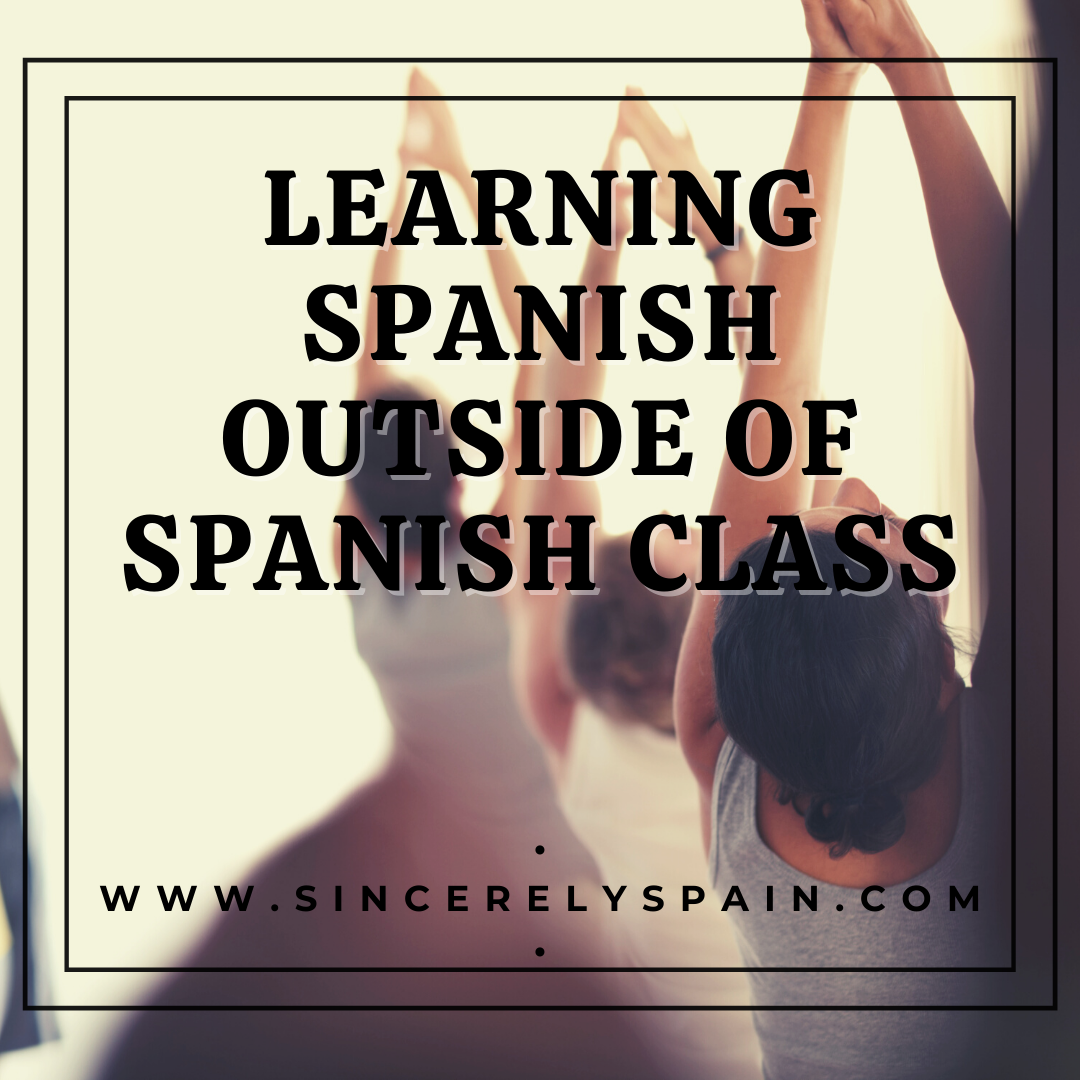
Top Six Ways to Learn Spanish Outside of Spanish Class

Dear John,
We know that when you come to live in Spain you are planning to learn Spanish and that you are considering taking some language classes (maybe at a language school?) to get ahead. That’s fantastic and we won’t advise you against it. However, we also want you to know that classes are not the only way to learn a language! Additionally, we think it is important that you keep in mind that learning a language is like a roller coaster and living in a non-native language is hard—so just try to do your best and don’t get down on yourself.
That being said, we believe the best way to learn a language—especially in the way that the locals actually speak it—is to really immerse yourself in activities you enjoy in Spanish. That way, you are ally motivated, you have the opportunity to learn vocabulary that is personally useful for you, and you are likely to make friends with the other Spaniards there as you already have something in common!
So, what exactly can you do outside of the Spanish classroom to continue on your language learning journey?
Here are our top six recommendations:
1.) Do yoga or take a gym class in Spanish: When Claudia first moved to Granada, she and her mom found a small yoga studio with a teacher who spoke some English and started taking yoga classes with him. It started out as an opportunity to seek mental clarity and just spend quality time together. One outcome she had not anticipated, though, was that it doubled as a Spanish class.
 Whenever you are thrown into a ‘native’ situation you have to expect that everyone around you will speak in their own language, even if the instructor is also giving cues in English. While beneficial, this can also be challenging because your brain has to work as hard as your body during the class. Still, it’s a worthwhile challenge as you come out having learned things you wouldn’t normally learn in normal Spanish class.
Whenever you are thrown into a ‘native’ situation you have to expect that everyone around you will speak in their own language, even if the instructor is also giving cues in English. While beneficial, this can also be challenging because your brain has to work as hard as your body during the class. Still, it’s a worthwhile challenge as you come out having learned things you wouldn’t normally learn in normal Spanish class.
2.) Join a peña: If the gym or structured sports are not your thing, think about joining a peña for team sports. Claudia has already talked about how she played soccer in Spain with a group of guys who are pretty fun. What she didn’t mention in that post is that it is also a great language learning opportunity.
Not only does playing a team sport allow you to learn the terminology used for that particular sport in Spain, we’ll likely end up with teammates who are comfortable correcting you when you say something wrong, the way Claudia’s teammates did. This can be incredibly motivating and useful if you strive to be able to communicate as well as possible, in all situations, not just academic ones.
3.) Hit up cultural courses: All around Spain, you can find different cultural centers that offer courses such as Flamenco dancing, cooking, or art history, like we have found at the university in Granada. We can not recommend enough signing up for a cultural course that interests you!
These courses will help you dive into specific cultural aspects that will allow you to connect further with the Spanish culture and better understand how Spain came to be. Additionally, you will also learn specific terminology and have access to different groups of people that you might never meet if you were only at Spanish school.
Bonus tip: If the course is something that mainly Spaniards sign up for it will be extra beneficial for your language learning.
 4.) Participate in one-day or weekend workshops: There are so many short conferences offered through organisations like the local universities and local government offices that cover topics from political debate to entrepreneurship education that are available to you if you know where to look. For example, Claudia was able to learn about workshops on entrepeneurialship and start-ups through her involvement at the Universidad de Granada and attending some of these allowed us to make new connections, while certainly putting our Spanish skills to the test.
4.) Participate in one-day or weekend workshops: There are so many short conferences offered through organisations like the local universities and local government offices that cover topics from political debate to entrepreneurship education that are available to you if you know where to look. For example, Claudia was able to learn about workshops on entrepeneurialship and start-ups through her involvement at the Universidad de Granada and attending some of these allowed us to make new connections, while certainly putting our Spanish skills to the test.
Taking advantage of a one or two-day workshop on a topic that is of interest to you will not only improve your knowledge of the topic but it packs the bonus of practicing your Spanish as well. By choosing a short course you also don’t have to worry about over-committing to something you don’t like or overwhelming yourself with too much Spanish.
5.) Don’t be afraid to sign up for a longer-term course: Once you’ve gotten comfortable with short-term workshops—or once you see a month-long course that just really interests you—we would recommend pushing yourself to dive into a longer-term course. We’ve often found that taking a course we are genuinely passionate about will have us doing more research and self-study to pick up on all the necessary vocabulary than we would have ever done for school.
When you study a topic you’re ally motivated to learn about in Spanish, you’re far more likely to push yourself to follow along and engage than you would be in an average language course. Additionally, this is a great way to form more long-term relationships with others who are interested in the same topic. We’re not always brave enough to approach someone on the first or second day, so having ample time to build up connections can be really helpful.
 6.) Live with natives: We have written entire articles on why you should live with Spaniards and how you can find local roommates, but it is worth mentioning here as well. Living with native speakers (whether it be a host family or sharing an apartment with individuals) can hugely benefit your language learning. We know it might seem more comfortable to live in a student residence, alone, or with friends—for people of all backgrounds—but putting yourself out there to make a new ‘family’ while abroad can be amazing in more ways than one.
6.) Live with natives: We have written entire articles on why you should live with Spaniards and how you can find local roommates, but it is worth mentioning here as well. Living with native speakers (whether it be a host family or sharing an apartment with individuals) can hugely benefit your language learning. We know it might seem more comfortable to live in a student residence, alone, or with friends—for people of all backgrounds—but putting yourself out there to make a new ‘family’ while abroad can be amazing in more ways than one.
Of those many ways, we would definitely put language skills at the top of that list. Surrounding yourself with native-speakers is a great way to ensure you will be speaking, or at least hearing, Spanish from the moment you wake up to the moment you fall asleep. In fact, when Claudia moved back to Spain to study her degree abroad, one of the first things she decided was to move out of her parents’ and in with Spaniards. Dani also opted to live with Spaniards for her first three years living in Granada after a wonderful host family experience while studying abroad. It really makes a big difference!
 Of course, there are more solo-endeavor options to language-learning, like reading, using Duolingo, or taking courses online through a platform like Preply or italki. These are great ways to supplement your Spanish-learning while abroad or at home but today we wanted to highlight six ways to get out of the classroom and engage with Spanish language learning while in Spain. Stay tuned for our upcoming article on learning Spanish before you move abroad.
Of course, there are more solo-endeavor options to language-learning, like reading, using Duolingo, or taking courses online through a platform like Preply or italki. These are great ways to supplement your Spanish-learning while abroad or at home but today we wanted to highlight six ways to get out of the classroom and engage with Spanish language learning while in Spain. Stay tuned for our upcoming article on learning Spanish before you move abroad.
What else are you doing to improve your language skills? Let us know!
Sincerely,
Spain




